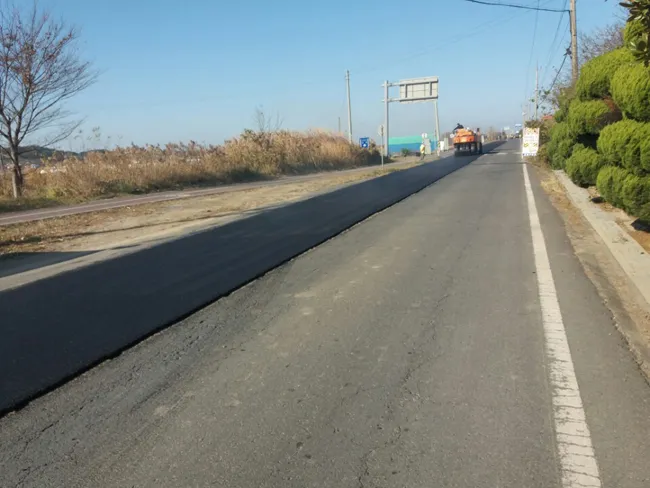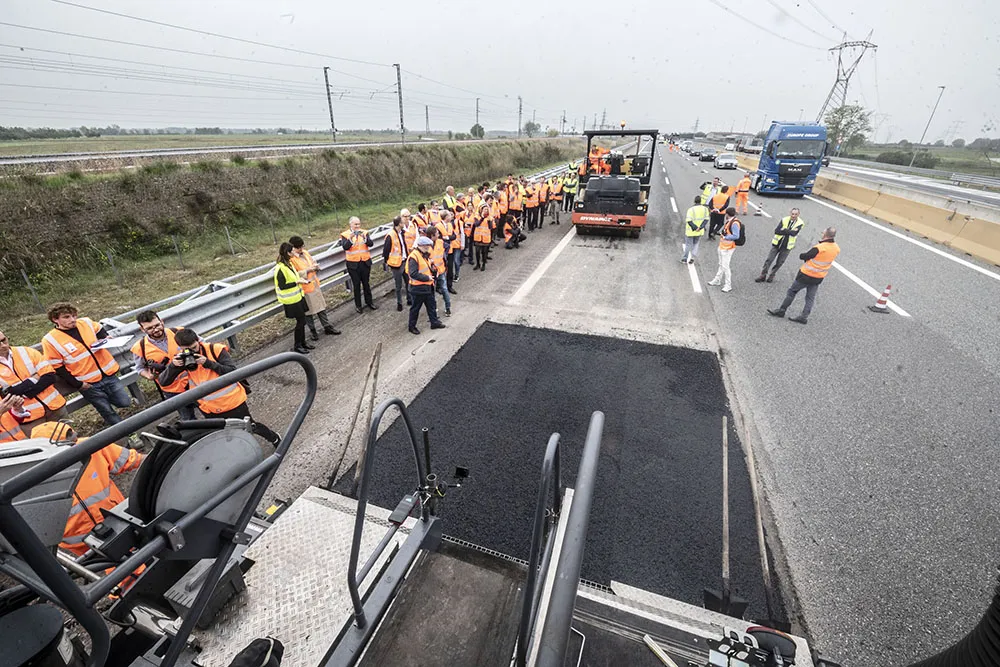A huge surplus of waste tyres and a strengthening commitment towards sustainability from local authorities has prompted asphalt supplier Tarmac to invest in technology to add crumb rubber to its mixes.
Around 40 million tyres are worn out every year in the UK. Some are burnt as fuel for cement kilns, others are turned to crumb rubber for use in sports fields and yet more are incorporated into items such as car mats. The surplus – sometimes as much as 120,000 tonnes annually - is often shipped abroad for
August 1, 2019
Read time: 3 mins

A huge surplus of waste tyres and a strengthening commitment towards sustainability from local authorities has prompted asphalt supplier 2399 Tarmac to invest in technology to add crumb rubber to its mixes.
Around 40 million tyres are worn out every year in the UK. Some are burnt as fuel for cement kilns, others are turned to crumb rubber for use in sports fields and yet more are incorporated into items such as car mats. The surplus – sometimes as much as 120,000 tonnes annually - is often shipped abroad for disposal or for use in other manufacturing services.
Tarmac has modified seven of its 72 asphalt plants so that 1% of crumb rubber by weight of the mix can be added to mixes. This is combined with a warm-mix additive, Evotherm, made by Ingevity, so that the harmful emissions are not produced during the manufacturing process. Tarmac reckons this equates to 750 waste tyres/km of road re-surfaced.
The company started investigating the use of end-of-life tyres in asphalt back in 2011. They chose a method that has been used successfully in the US for over a decade, explained Brian Kent, Tarmac’s technical director.
“Local authorities want to be green, sustainable and environmentally friendly,” he said. “I get the sense that these issues are more important to them now and we are going to get some traction.”
The mix process is somewhere between the wet and dry processes for adding rubber to asphalt mixes. The rubber becomes part of the asphalt matrix, melting at first and then re-solidifying to act “like a glue”, said Kent.
The result is a mix that is better than one created with standard bitumen, albeit not as enhanced as one made with a polymer-modified bitumen. Kent acknowledged that there are no definitive test results that provide performance data on the ageing of asphalt with a rubber mix.
However, “talking to colleagues in America, they have come to the conclusion that because rubber is in the material, it is helping to delay crack propagation and that means the roads are lasting longer”, said Kent. Where rubber is used in stone mastic asphalt mixes, the crumbs sit in some of the air voids, improving waterproofing and hence enhancing durability.
Modifications to Tarmac’s asphalt plants involved adding an automated feeding system that includes a silo, a screw for mixing and software installation. Other plants will be upgraded, depending on market demand, said Kent.
The first UK authority to trial the mix was the English city of Coventry and the government agency Highways England has been carrying out a trial on the M1 motorway near East Midlands Airport. Authorities in London, Nottingham and Leicester are also planning trials with several others expressing interest, said Kent.
Around 40 million tyres are worn out every year in the UK. Some are burnt as fuel for cement kilns, others are turned to crumb rubber for use in sports fields and yet more are incorporated into items such as car mats. The surplus – sometimes as much as 120,000 tonnes annually - is often shipped abroad for disposal or for use in other manufacturing services.
Tarmac has modified seven of its 72 asphalt plants so that 1% of crumb rubber by weight of the mix can be added to mixes. This is combined with a warm-mix additive, Evotherm, made by Ingevity, so that the harmful emissions are not produced during the manufacturing process. Tarmac reckons this equates to 750 waste tyres/km of road re-surfaced.
The company started investigating the use of end-of-life tyres in asphalt back in 2011. They chose a method that has been used successfully in the US for over a decade, explained Brian Kent, Tarmac’s technical director.
“Local authorities want to be green, sustainable and environmentally friendly,” he said. “I get the sense that these issues are more important to them now and we are going to get some traction.”
The mix process is somewhere between the wet and dry processes for adding rubber to asphalt mixes. The rubber becomes part of the asphalt matrix, melting at first and then re-solidifying to act “like a glue”, said Kent.
The result is a mix that is better than one created with standard bitumen, albeit not as enhanced as one made with a polymer-modified bitumen. Kent acknowledged that there are no definitive test results that provide performance data on the ageing of asphalt with a rubber mix.
However, “talking to colleagues in America, they have come to the conclusion that because rubber is in the material, it is helping to delay crack propagation and that means the roads are lasting longer”, said Kent. Where rubber is used in stone mastic asphalt mixes, the crumbs sit in some of the air voids, improving waterproofing and hence enhancing durability.
Modifications to Tarmac’s asphalt plants involved adding an automated feeding system that includes a silo, a screw for mixing and software installation. Other plants will be upgraded, depending on market demand, said Kent.
The first UK authority to trial the mix was the English city of Coventry and the government agency Highways England has been carrying out a trial on the M1 motorway near East Midlands Airport. Authorities in London, Nottingham and Leicester are also planning trials with several others expressing interest, said Kent.









